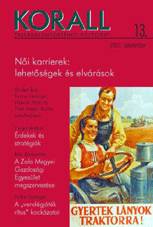A „vendégjáték rítus” kockázatai. A Csárdáskirálynő Romániában, 1958-ban
Hazards of the Interstate Cultural Relations: the „Theatre Tour Ceremony”. The Princess Csárdás in Romania, in 1958
Author(s): Gyöngyi HeltaiSubject(s): Cultural history
Published by: KORALL Társadalomtörténeti Egyesület
Keywords: social history; cultural politics; cultural life; operetta; Conflict of Hungary and Romania; Hungarian minority in Romania; 1956 Revolution
Summary/Abstract: This paper focuses on the adaptability of a boulevard theatre genre in the context of totalitarian communism. Prior to 1945, the Hungarian operetta was a popular branch of mass culture that was integrated into international show business. When Hungary became part of the Soviet Empire, the intrusion of socialist realist aesthetics into the music theatre practice resulted in performances containing a mixture of entertainment and political propaganda. The professionalism of pre-war stars made the “socialist operetta” a relatively successful schematic theatre genre that was used in interstate cultural relations between Soviet block countries. These state-organised theatre tours were accompanied by ritualised, formalised manifestations of political friendship. This essay focuses on the Romanian tour of a “socialist version” of The Princess Csárdás. The adaptation was represented abroad as Hungarian socialist realist theatre art, despite the fact that the operetta composed by Imre Kálmán had already been staged in 1916. Based on confidential reports of the Hungarian diplomacy, the paper outlines the intended political goals and the actual gains of the Romanian tour. How was the ambiguous message of The Princess Csárdás read in Bucharest and Kolozsvár (a former Hungarian town, with a huge Hungarian minority)? What was the wider political context of this tour, and how did it relate to the Romanian role in the defeat of the 1956 revolution? These are the questions that arose from this example of appropriation of a significant piece of mass culture in a state socialist environment.
Journal: Korall - Társadalomtörténeti folyóirat
- Issue Year: 2003
- Issue No: 13
- Page Range: 125-143
- Page Count: 19
- Language: Hungarian

